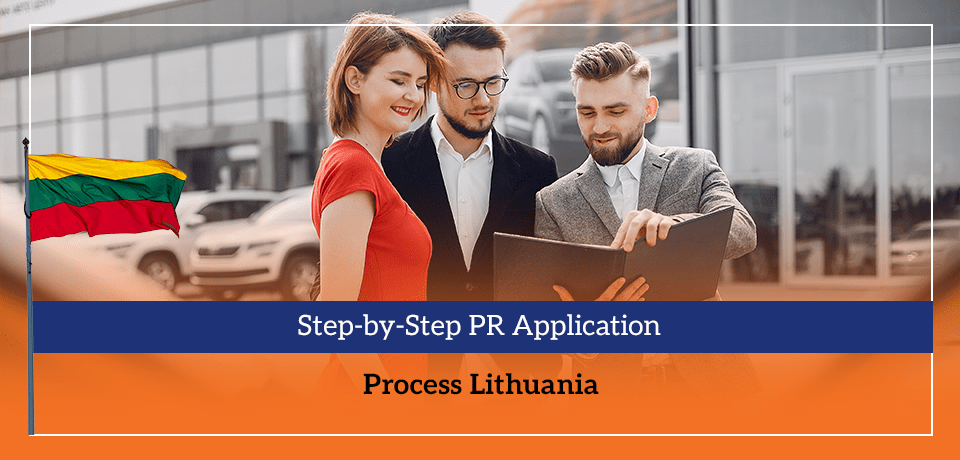More and more students are choosing Lithuania to study and stay afterward. The country offers great opportunities after you finish your studies. Once you get permanent residency (PR), many doors open for you.
Lithuania is now making things easier. In 2025, they updated their PR rules. The new rules help students move from studies to PR more smoothly. If you study, work, and stay legally, you have a clear path to PR.
But how to get PR in Lithuania after study? What do you really need to get PR? Let’s break down the main rules and see who can apply in 2025.
Lithuania’s PR Requirements for Graduates (2025 Updates)
Getting PR in Lithuania takes time and planning. But it is possible. In 2025, the rules became more student-friendly. Still, you must meet some important conditions.
Eligibility Criteria for PR After Studies
Getting PR in Lithuania takes time and planning. But it is possible. In 2025, the rules became more student-friendly. Still, you must meet some important conditions.
The first rule is about how long you’ve stayed in Lithuania. You need to live there legally for five years. Your study time can count. But only if you stayed with a valid visa or permit.
Next, you must have a full-time job or stable income. This shows you can support yourself. In 2025, the minimum salary for Lithuania PR is around €1,038 per month. That’s the income you must show to apply.
You also need to fulfill Lithuanian language requirements for PR. A basic level is enough. You must pass a B1 level language exam. Along with that, there is an integration exam. This checks how well you know Lithuanian laws and culture.
After obtaining PR, you will receive a permanent residence certificate. Then, after 10 years of permanent residence, you can apply for Lithuanian citizenship.
How Your Study Period Counts Toward PR
Many students wonder if their study years count toward PR. The answer is yes, but not fully. Lithuania counts your study time, but it’s only partial.
Each year spent on a student permit counts as half a year for PR. So, if you studied for 4 years, it counts as 2 years toward PR. You still need to stay and work for some time after your studies.
Also, you must not leave the country for long. If you’re outside Lithuania for over 6 months in one year, that time may not count. So staying in the country helps you reach PR faster.
PR Eligibility - Students vs. Workers
|
Criteria
|
International Students
|
Full-Time Workers
|
|
Residency Duration
|
5 years (study counts half)
|
5 years (full count)
|
|
Income Requirement
|
€1,038/month (after studies)
|
€1,038/month
|
|
Language Level
|
B1 Lithuanian + Integration Exam
|
B1 Lithuanian + Integration
|
|
Study Period Counted
|
100% per study year (if completed degree)
|
100% per year
|

Step-by-Step PR Application Process Lithuania 2025
From Student Visa to Temporary Residence Permit in Lithuania
After you finish your studies, your student visa will expire. So, what’s next? Student visa to PR pathway.
You can apply for a job-seeker visa. This gives you 12 months to find a job. During this time, you must stay in Lithuania and search actively. Once you find a job, you can apply for a Temporary Residence Permit (TRP). This permit lets you stay and work legally in the country.
The TRP is usually valid for 1 or 2 years, depending on your job contract. You can renew it until you complete the required 5 years of legal stay for PR.
Documents Checklist for PR Application
When applying for PR, having the right documents is very important. Here’s what you need in 2025:
- Valid passport
- Your residence permit or visa history
- Proof of Sufficient Financial Resources
- Certificate of No Criminal Record
- Rental agreement or proof of housing
- Language certificate (B1 level Lithuanian)
- Integration exam certificate
- Health insurance proof
- Completed PR application form
Navigating the Migration Department Process
Once your papers are ready, submit your PR application to the Migration Department. You can do this online through the official portal. As of 2025, the average Lithuania PR processing time is 3 to 6 months. Some may get results faster if all documents are perfect.
The Migration Department checks your full history. They look at your visa, job, income, and language level. If everything is okay, you get a 5-year permanent residence card. In 2024, the approval rate for PR applications was about 88.2%. That means most people got accepted, especially those with jobs and a legal stay.

Post-Study Job Opportunities
After your studies, getting a job is not just helpful, it’s necessary. A stable job shows that you can support yourself. It also helps you meet the PR income rule. That’s why job hunting is a big step in your PR journey.
Many students worry about finding the right job. But don’t stress. The Lithuanian job market for graduates is pretty strong. Some sectors are especially open to international graduates. Your university can also support you during this time.
Top In-Demand Sectors for International Graduates
Getting a job after studying is very important for PR. In 2025, Lithuania will have many job openings in key areas.
Tech jobs are highly in demand. Companies need software developers, data analysts, and IT support staff. Engineering is also strong. Many factories and companies want mechanical, civil, and electrical engineers. Healthcare is another big field. You'll find many jobs if you studied nursing, pharmacy, or public health.
According to the Lithuanian Labor Market Report, these three sectors are hiring the most. So if your degree fits into one of them, your PR chances get stronger. Also, jobs in these areas often offer visa sponsorships. This means the company can support your TRP.
How to Leverage University Career Services
Universities in Lithuania don’t just give you an education. They also help you find jobs. Most universities have career service centers. These centers help with CV writing, job interviews, and company connections.
For example, Vilnius University often works with big companies in Lithuania. They arrange career fairs and internship programs too.
Many graduates get hired through these university events. So, always stay in touch with your career center, even after graduation.
High-Demand Jobs Lithuania (2025)
|
Sector
|
Common Job Roles
|
Average Salary (€)
|
Visa Sponsorship Likely?
|
|
IT & Tech
|
Developer, Analyst, Tester
|
€1,800 – €2,500
|
Yes
|
|
Engineering
|
Civil, Electrical Engineer
|
€1,500 – €2,200
|
Yes
|
|
Healthcare
|
Nurse, Pharmacist
|
€1,400 – €2,000
|
Yes
|
Finding a job is not just about money. It helps build your PR profile. A job proves you’re part of society. You earn, you pay taxes, and you grow your career.
Overcoming Common PR Application Challenges
Even if you follow all the steps, sometimes things can feel tricky. Some students face problems while applying for PR. But don’t worry. These problems are normal, and there are ways to solve them.
Let’s look at the two most common issues and how you can handle them.
Language Barrier Solutions
One big challenge is the Lithuanian language. To get PR, you must pass a B1 level test. Many students find this part hard.
But the positive side is that the government helps you learn for free. There are free language courses in many cities. These are made for people who want to live in Lithuania for the long term. You can join these classes during or after your studies. They teach basic speaking, writing, and listening skills.
Also, try using apps like Duolingo or LingQ to practice at home. If you study a little every day, the test becomes easier.
Financial Proof Hacks
Another big challenge is showing proof of money. For PR, you need to show a stable income. You can show this through bank statements, work contracts, or other forms of proof. Earning at least €1,038 per month is a minimum requirement.
If you don’t earn enough from your job, don’t panic. You can also use your savings to support your application. If you worked part-time during your studies, you can show old payslips too.

Frequently Asked Questions
Can I apply for PR immediately after graduation?
No, you cannot apply right after graduation. You need to live in Lithuania for five years first. Your study years count, but you also need legal work and a stable income after studying. So, you must spend some time working before applying for PR.
Is the Lithuanian language test mandatory for PR?
Yes, the test is required. You must pass the B1 level Lithuanian language test. Without this certificate, you can’t apply for PR. But don’t worry. There are free courses to help you prepare.
How long does PR approval take in 2025?
As of 2025, it usually takes 3 to 6 months to get PR approval. The timing depends on your documents, how busy the Migration Department is, and if anything is missing. Applying early and uploading all files correctly can speed things up.
Can I include my family in my PR application?
Yes. Once you get a PR, your spouse and kids can also apply. They must meet some conditions, such as legal stay, health insurance, and proof of basic income. After that, they can live with you under family reunification rules.
What’s the difference between TRP and PR?
TRP means Temporary Residence Permit. It’s short-term, and you must renew it often. PR means Permanent Residency. It lets you stay for longer without yearly renewals. PR also gives you more rights like healthcare, better jobs, and travel across the EU.
Does a PhD accelerate PR eligibility?
Yes, it helps a little. If you do a PhD in Lithuania, your study time usually counts fully toward the 5-year stay rule. Also, PhD students often work part-time, which adds to their legal stay and income record, making PR easier.
Can I switch employers during the PR process?
Yes, you can change your job. But you must still meet the income rule. Your new job must also be legal and full-time. If you stop working, your PR may be delayed. So, always inform the Migration Department about job changes.
What are the tax implications of PR?
With PR, you become a long-term tax resident of Lithuania. This means you pay local income tax like citizens. But you also get free healthcare and social benefits. Always declare your income properly to stay safe with tax rules.
Conclusion
Getting PR in Lithuania after your studies may seem hard at first, but it’s really possible if you plan ahead. Start by understanding the rules early. Then, focus on getting a good job, learning the language, and staying legally in the country.
So, if you’re wondering how to get PR in Lithuania after study, the answer is simple. Stay informed, stay legal, and take one step at a time. Your dream of long-term life in Lithuania is closer than you think.